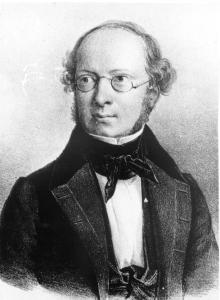Alexander von Bunge
Alexander von Bunge | |
|---|---|
 Lithograph by Eduard Hau | |
| Born | 6 October 1803 |
| Died | 18 July 1890 (aged 86) |
| Citizenship | Russian |
| Scientific career | |
| Fields | Botany |
| Institutions | University of Dorpat |
Alexander Georg von Bunge (Russian: Aleksandr Andreevich von Bunge, Алекса́ндр Андре́евич Бу́нге; 6 October [O.S. 24 September] 1803 – 18 July [O.S. 6 July] 1890) was a Russian botanist. He is best remembered for scientific expeditions into Asia and especially Siberia.
Biography
Bunge was born as son of a family that belonged to the German minority in Tsarist Russia. His father Andreas Theodor was the son of Georg Friedrich Bunge, a pharmacist who had emigrated from East Prussia to Russia in the 18th century. He studied medicine at the University of Dorpat, later serving as a professor of botany in Kazan. In 1835, he returned to Dorpat, where he taught classes in botany until 1867. Here, he kept in contact with Diederich Franz Leonhard von Schlechtendal, a botanist at the University of Halle, through correspondence, via articles published in the journal "Linnaea" and through the exchange of herbarium specimens.[1] He remained in Dorpat until 1881, spending his later years there conducting investigations of Estonian flora.[2]
In 1826 with Carl Friedrich von Ledebour and Carl Anton von Meyer, he embarked on an important scientific expedition to the Kirghiz Steppe and Altai Mountains.[3][4] In 1830–31, he traveled to Beijing by way of Siberia, through which he conducted extensive research of Mongolian flora.[1] Following his investigations in China, he returned to the Altai Mountains, where he conducted studies of the eastern part of the region (1832). In 1857–58 he took part in a scientific expedition to Khorasan and Afghanistan.[4]
He was the father of physiologist Gustav von Bunge (1844–1920) [1] and of Alexander von Bunge (1851–1930), an explorer and zoologist.[5] His older brother, Friedrich Georg von Bunge (1802–1897), was a legal historian.
Commemoration
- Taxa
- Genus Bungea (family Orobanchaceae, formerly a member of the family Scrophulariaceae).[3]
- Pulsatilla bungeana from genus Pulsatilla
- Euonymus bungeanus from genus Euonymus
- Allium bungei from genus Allium
- Pinus bungeana from genus Pinus.[6]
- Fraxinus bungeana from genus Fraxinus
- Clerodendrum bungei from genus Clerodendrum
- Catalpa bungei from genus Catalpa.[7]
- Girgensohnia bungeana from genus Girgensohnia
- Iris bungei from genus Iris
- Places
Bunge Land in the New Siberian Islands [citation needed] and a crater on Mars were named after him.
Selected writings
- Flora Altaica; scripsit Carolus Fridericus a Ledebour, adiutoribus Car. Ant. Meyer et Al. a Bunge. (1829–1833)
- Enumeratio plantarum quas in China boreali collegit Dr. Al. Bunge. Anno 1831. (1832)
- Plantarum mongolica-chinensium decas fine. (1835)
- Alexandri Lehmann reliquiae botanicae; sive, Enumeratio plantarum in itinere per deserta Asiae Mediae ab A. Lehmann annis 1839–1842 collectarum. Scripsit Al. Bunge. (1847)
- Beitrag zur kenntniss der flor Russlands und der steppen Central-Asiens, (1851) – Contribution to the knowledge of flora native to Russia and the steppes of Central Asia.
- Plantas Abichianas in itineribus per Caucasum regionesque Transcaucasicas collectas, enumeravit A. Bunge. (1858)
- Generis Astragali species gerontogeae. (1868–1869).[4]
- Labiatae persicae, (1873).[8]
See also
References
- ^ a b c Alexander von Bunge (1803–1890), a prominent researcher of Mongolian flora Archived 2016-03-04 at the Wayback Machine Martin-Luther-University Halle-Wittenberg | Schlechtendalia P-ISSN 1436-2317 E-ISSN 2195-9889
- ^ JN Nutrition Biography of Gustav B. von Bunge
- ^ a b CRC world dictionary of plant names. 1. A – C by Umberto Quattrocchi
- ^ a b c JSTOR Global Plants Bunge, Alexander Andrejewitsch (Aleksandr Andreevic (Aleksandrovic) von (1803–1890)
- ^ Encyclopedia of the Arctic by Mark Nuttall
- ^ Encyclopedia of Stanford Trees, Shrubs, and Vines PINACEAE
- ^ Manchurian Catalpa Catalpa bungei by Richard T. Olsen and Joseph H. Kirkbride, Jr.
- ^ Biodiversity Heritage Library (bibliography)
- ^ International Plant Names Index. Bunge.
External links
- 19th-century Estonian people
- 19th-century German botanists
- 19th-century German zoologists
- 19th-century Russian scientists
- 1803 births
- 1890 deaths
- Burials at Raadi cemetery
- Estonian biologists
- Estonian botanists
- Estonian explorers
- Estonian zoologists
- Ethnic Germans of the Russian Empire
- Explorers of Siberia
- Full Members of the St Petersburg Academy of Sciences
- Botanists of the Russian Empire
- Explorers of the Russian Empire
- University of Tartu faculty
